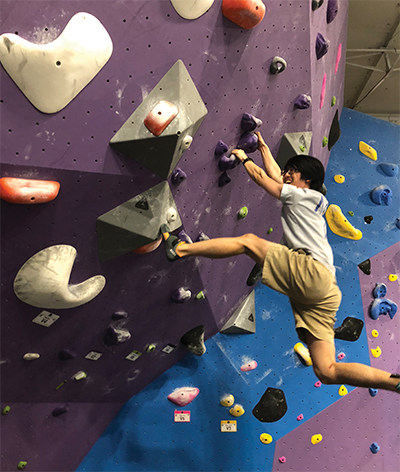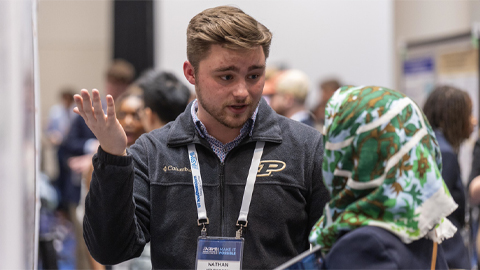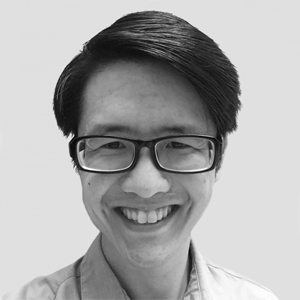How I learned to stop worrying about grad school* and to love climbing rocks
I recently started bouldering, which is rock climbing without the rope or associated safety gear. As the name implies, the sport historically involved climbers attempting to conquer boulders outdoors. Nowadays, there is an indoor option with human-designed walls, artificial lights and padded floors.
My previous forays into building an exercise regime inevitably petered out. The touted benefits of an aerobic workout did little to outweigh the pain and boredom of running; though my mood was heightened in the hours and days after a good run, the anticipated wheezing, groaning and misery meant I never looked forward to lacing up my running shoes. In the face of this dread, I stopped putting on my running shoes at all.
 Richard Sima nearly slips off a rock wall at an EarthTreks gym in Baltimore but manages to catch himself.
Hannah Ahn
Richard Sima nearly slips off a rock wall at an EarthTreks gym in Baltimore but manages to catch himself.
Hannah Ahn
Every Tuesday, I find myself sweating and holding onto a wall for dear life.
Climbing was different from the start. I have to be mentally present every time I’m on the rock wall because inattention has immediate consequences. Not checking the placement of my feet before shifting my entire body weight will lead to a fall. Not judging clearly the distances between two handholds will lead to a fall. Becoming distracted by thoughts about experiments and analyses waiting back at the lab also will lead to a fall. In this way, climbing has a meditative quality. The danger I feel hanging even a few feet off the ground is enough to focus my attention on the task at hand as opposed to the myriad ideas, internal monologues and latent anxieties I would otherwise occupy myself with.
The climbing routes are distinguished from one another by color, each assigned a difficulty and quirkily named — “Long Way Home,” “Time for Coffee,” “You Have Feet.” The beginner routes include many platforms, called holds, that are large or have hand-conforming edges, making them easy to grab or stand on. Five months in, I’m climbing at a V3 level, which is solidly intermediate. The routes I now climb feature smaller holds, tougher transitions and increased soreness post-climb.
Each step up the wall is gratifying, mentally and physically. Bouldering forces me to move and sense my body in ways I’ve never done before. My fingers and hands are more sensitive to the weight and pressure I put on them, even as the skin on my palms becomes increasingly calloused with use. I’ve learned to move my feet and legs with greater precision and to trust the weight I can put on even just the toe of my shoe as I reach for a higher hold. Feeling the pull of gravity is thrilling as I let go with one hand and rebalance myself. When I’m clinging to a wall some ten feet off the ground, my lab experiments are far from my mind.
For me, climbing is a way of getting over the fear of failure through what amounts to exposure therapy in a low-risk setting; by being repeatedly exposed to something that provokes anxiety in a low-stakes environment, I can habituate myself to that stress of failure. Research shows this to be a benefit of hobbies outside the lab. Bouldering gives me a chance to fail often and publicly. If you aren’t failing at climbing, then you aren’t trying to push yourself to improve.
This is something I’ve had to get used to. It’s easy to feel self-conscious approaching a new problem or climbing route, getting my hands on the starting holds and then immediately realizing I have no idea what to do next. I contort my body in various angles and directions, trying to find purchase on the next step, which initially seemed so easy and obvious. No doubt I look very silly.
I notice, however, that climbers with years of experience go through this same awkward dance on difficult problems that are new to them. There’s nothing wrong or embarrassing about it. They also have to drop down as their strength gives way or they lose their balance. Even the seasoned veterans fall. The key is to then brush oneself off, take a deep breath and try again. Each attempt decreases my anxiety and makes the eventual success that much sweeter.
The climbing gym I frequent is well-suited for those keeping typical graduate student hours: it opens early and closes at 11 p.m. Unlike tennis, my previous sport of choice, bouldering does not require a partner, so there is no need to wrangle conflicting schedules or deal with dropped plans due to an experiment that took longer than expected.
Climbing is a social activity, however, and the community has been very open and welcoming. We all learn from watching one another, and we sometimes share pointers on different approaches to a route we’re struggling with. As a neophyte, I find it inspiring to see children a fifth my age and a third my height scramble up routes I have not yet dared to attempt. I see how far I have to go in improving my physical strength and skill. But I also see how far I’ve come, and I take pride in what I have learned thus far.
I’m not sure where I’ll be when I (fingers crossed) finish my thesis later this year. But I know many more routes will be left to climb, and I’ll take each of them one step at a time.
Enjoy reading ASBMB Today?
Become a member to receive the print edition four times a year and the digital edition monthly.
Learn moreGet the latest from ASBMB Today
Enter your email address, and we’ll send you a weekly email with recent articles, interviews and more.
Latest in Opinions
Opinions highlights or most popular articles

Hope for a cure hangs on research
Amid drastic proposed cuts to biomedical research, rare disease families like Hailey Adkisson’s fight for survival and hope. Without funding, science can’t “catch up” to help the patients who need it most.

AI can be an asset, ASBMB educators say
Pedagogy experts share how they use artificial intelligence to save time, increase accessibility and prepare students for a changing world.

Sketching, scribbling and scicomm
Graduate student Ari Paiz describes how her love of science and art blend to make her an effective science communicator.

Embrace your neurodivergence and flourish in college
This guide offers practical advice on setting yourself up for success — learn how to leverage campus resources, work with professors and embrace your strengths.

Survival tools for a neurodivergent brain in academia
Working in academia is hard, and being neurodivergent makes it harder. Here are a few tools that may help, from a Ph.D. student with ADHD.

Hidden strengths of an autistic scientist
Navigating the world of scientific research as an autistic scientist comes with unique challenges —microaggressions, communication hurdles and the constant pressure to conform to social norms, postbaccalaureate student Taylor Stolberg writes.

